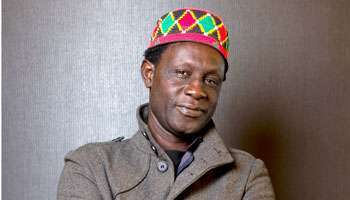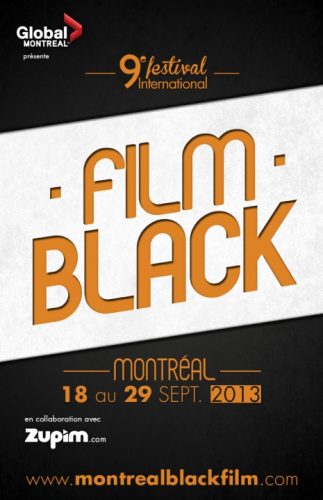MIBFF MIBFF MIBFF
Gideon’s Army , 2012, US, is an HBO documentary following the stories of three public defense lawyers in the United States who are idealistic enough to work long hours, earn a miserable pay and sometimes suffer death threats from clients whose cases did not prosper. Their clients are too poor to pay the ridiculously high bail demanded by an inhuman legal system and are more often than not Black or members of other disaffected minorities. Their payoff? The feeling that they might just make a difference. Travis Williams, Brandy Alexander and June Hardwick are the three young public defenders from the Deep south profiled in this low-key but solid documentary who do make a difference. It is only in the Montreal Black Film Festival that one can see what’s going on in a country whose president might be Black but whose legal system is jaundiced.
Reviewed by Maya Khankhoje
MIBFF MIBFF MIBFF
In a talk with the public before the screening of his film, Senegalese filmmaker Moussa Touré claimed that he was not a tender person, at least with the oppressor. It was difficult to believe him because his soft spoken voice and warm smile belied the toughness that he exhibited as a filmmaker.

Desaltres is yet another documentary about exile and otherness. Desaltres means the others in Catalan. This film explores the relationship between Malian workers in San Felieu, a small village 35 km from Catalonia, and the local inhabitants. Eight years have elapsed since this dozen or so men landed on this Spanish coast as boat people, famished and thirsty. They make a living as construction workers or crop pickers. Outside working hours nobody has managed to establish contact with the local residents. Touré interviews these men who explain that their lives are limited to working, eating, watching the occasional soccer match in the local bar and going to sleep. By the way, they are often charged almost twice as much for a cup of coffee than the local residents during the soccer season. They have not brought their families because they don’t feel truly welcome and find housing a problem. The locals insist they don’t want to rent them a place because there are too many people in a single flat, the Malians explain that this is due to the fact that they are often denied leases and do not want to leave their brothers out in the cold. And the incomprehension goes on and on each side blaming the other side.
In comes Touré with his probing questions. The men start getting ideas. One of the men suggests a debate in City Hall with the locals. The meeting takes place, each side expresses its grievances and at the end they shake hands, smile and kiss each other on the cheek…twice!
The public does not learn what the long term results of this rapprochement are but we do learn from the director that one of the local girls started dating a Malian man and there was talk of Catalan lessons by volunteers and perhaps joint soccer matches. We also learn that the conservative mayor (who considered Spaniards from other provinces as foreigners) lost the election to a socialist man who, when interviewed by Toure, was one of the few who welcomed the Malians.
Progress? Yes, poorvoo que sa door – provided it lasts, to quote Napoleon’s mother when referring to her son’s victories.
Reviewed by Maya Khankhoje
MIBFF MIBFF MIBFF
The 9th International Black Film Festival opened in Montreal on September 18 with a tribute and award to Danny Glover and the world premiere of Chasing Shakespeare, a film in which he stars.
Chasing Shakespeare is a charming love story between a black boy and an aboriginal American girl set in the 70’s in the Deep South. It is also the story of deep abiding love between a mature man and a mature woman facing the reality that one of them will leave the other one bereft. The frequent flashbacks provide the time frame of events. The film, a very free adaptation of Shakespeare’s Romeo and Juliet, is visually stunning and very poetic, although, for this reviewer’s taste, a tad cloying. The ominous sound track, punctuated by frequent thunder and lightning, essential to the story line, doesn’t help. However, the sound and visual effects do not drown out the very subtle albeit clear message: racism is alive and well even in a society that claims to be a meritocracy. And yes, minorities can and do become stronger when they join hands.
The excellent cast, which includes Afro American actor Danny Glover, Native Canadian actors Tantoo Cardinal and Graham Greene, Chelsea Ricketts, Mike Wade and Clarence Gilyard, add value to the movie. Director, producer and filmmaker Norry Niven aimed to make a film “that nourished the soul like a spring”. He certainly succeeded.
MIBFF MIBFF MIBFF
DANNY GLOVER: A PROFILE
by Maya Khankhoje
Danny Glover is well known as an Afro American actor, director, playwright, political activist and humanitarian. He is the second actor to receive the Humanitarian Prize that the festival first awarded to Glover’s close friend Harry Belafonte last year. Many are aware of his work in films like The Color Purple and in the Lethal Weapon series but few might realize that Danny Glover is first and foremost a humanitarian who is not afraid to put his activism before his professional career. In fact, Glover believes that his career has actually suffered because of his politics. This would not be surprising considering he has been arrested more than once for decrying US military interventions and speaking out in favor of Palestinian rights. He is not a friend of Bush and laments the fact that Obama has played out the same story line as previous presidents but blames the system for this. His production
company produced a documentary providing an inside view of Hurricane Katrina in New Orleans and another one denouncing the global arms sale.
Glover has been the recipient of an honorary doctorate, numerous humanitarian and professional awards and is currently a UNICEF ambassador. During the press conference and later during the award ceremony, Glover made it very clear that his social consciousness was first awakened by his maternal lineage of sharecroppers and then deepened and refined by the work of South African playwright Athol Fugard as well as by books such as The Black Jacobins, about the 1804 revolution in Haiti and its hero Toussaint L’Ouverture.
Danny Glover is proud to be the grandfather of a ten-year old boy who acquired his first kitten the day before he travelled to Montreal. His message to young people is to tell the stories that need to be told so as to shift the cultural paradigm. He says that throughout his life he has watched men and women grow and hopes that the next generations continue to make their own history, just as Paul Robeson had urged.

